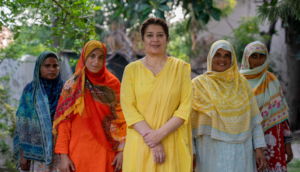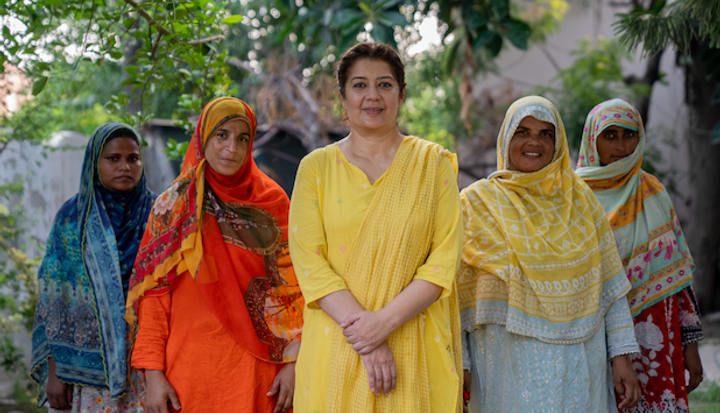There’s a credit gap, not a confidence gap, limiting women entrepreneurs.
Women represent only one in four high-growth entrepreneurs globally. Yet, they are not holding themselves back. Instead, they are systematically disadvantaged by social and institutional barriers, leaving one in three unable to access the critical financial resources needed for business growth.
New research conducted through the Strive Women program, implemented by CARE and supported by the Mastercard Center for Inclusive Growth, reveals that 96% of the 2,000 women entrepreneurs spoken to (in countries as different as Pakistan, Peru and Vietnam) report high confidence in their ability to lead and grow their businesses, and 87% have the specific goal to do so.
These high levels of confidence reported by women entrepreneurs point to significant economic potential. Further research indicates that confidence directly improves business outcomes and profitability. Yet without the systems and market actors to support them, women entrepreneurs remain blocked from their full potential. These challenges are further compounded by the disproportionate impact of the climate crisis on women and girls, which exposes them and their businesses to shocks. By some estimates, providing equal business opportunities to women could add up to $6 trillion to the global economy, while also directly improving the quality of life for women and girls.
Let’s consider the paradox further
While these entrepreneurs demonstrate remarkable business acumen and resilience, they face systemic barriers that have nothing to do with their capabilities. Women entrepreneurs are exceptionally confident and show a strong commitment to reinvest in their communities and adapt their businesses to market changes. So, why aren’t they being inundated with the financial products and support systems they need to thrive?
The new Strive Women research goes on to reveal that women entrepreneurs are far more than aid beneficiaries in current climate and economic crises; they’re experienced, ambitious, and committed to building their sustainable businesses; 90% have set clear business goals, 97% of them express confidence in their ability to reach these targets, and 87% feel prepared for any unplanned event that might negatively affect their business. Yet financial institutions often overlook women entrepreneurs as credible, growth-oriented clients. Instead, they are sidelined as CSR efforts, missing their potential as economic drivers and market catalysts.
What the research tells us
- Access to finance: Nearly a third (27%) report a lack of adequate access to finance. This need extends beyond merely obtaining financing; 60% of respondents expressed clear demand for lower interest rates, while others pointed to small loan sizes and restrictive, short-term repayment schedules as persistent barriers. The lack of fair financial options—exacerbated by limited trust in financial institutions and gender-based discrimination—hinders these entrepreneurs’ potential to scale and sustain their enterprises.
- Importance of support networks: A trusted network of confidants is another pillar of entrepreneurial success, offering a blend of non-financial support, strategic advice, and essential emotional wellbeing. Yet, 34% lack this crucial network. Peer networks do more than just provide support; they offer a safe space for sharing experiences, advice, and encouragement, which can be vital in male-dominated business environments.
- Digital technology confidence gap: The digital divide presents a formidable challenge for women entrepreneurs, with 33% lacking confidence in their ability to navigate digital tools. This gap in digital proficiency limits access to opportunities and resources that could otherwise propel their businesses forward. In an era where technology underpins every facet of business operations, the digital skills gap leaves women entrepreneurs at a disadvantage.
Women-centered design is good business
These gaps call for a paradigm shift. Women-centered design (WCD) for financial services is a savvy investment in a client segment that already demonstrates impressive returns. As Ana Cecilia Akamine, CEO of Strive Women partner Financiera Confianza, says “[Women] are reliable payers, making them a valuable and underserved market. Investing in women is not only a social priority but a sound business decision.” Women entrepreneurs need accessible, appropriately sized loans, networking opportunities, and digital solutions that reflect their realities. WCD tailors approaches to the realities of women’s lives and all the barriers they overcome into financial service design, ensuring that products are desirable, feasible and viable.
Resilience in the face of new challenges
To make market systems work better for women entrepreneurs, and get women leading in green business, CARE is calling on all of us to shift the narrative. Don’t view women entrepreneurs through a lens of disenfranchisement. Instead recognize their high confidence and understanding of their own business needs.
We must challenge patriarchal ideas in our minds and societies and listen more closely to the experiences of women entrepreneurs, investing in research that identifies their needs and engaging them as valued clients, suppliers, and leaders that build sustainable economies.
So the next time you envision a confident entrepreneur, think of the women who are driving change against the odds, demanding systems that work as hard for them as they do for their businesses.

To hear more from the women themselves, here are Saima, Maria Jose, and Chanh’s stories.










